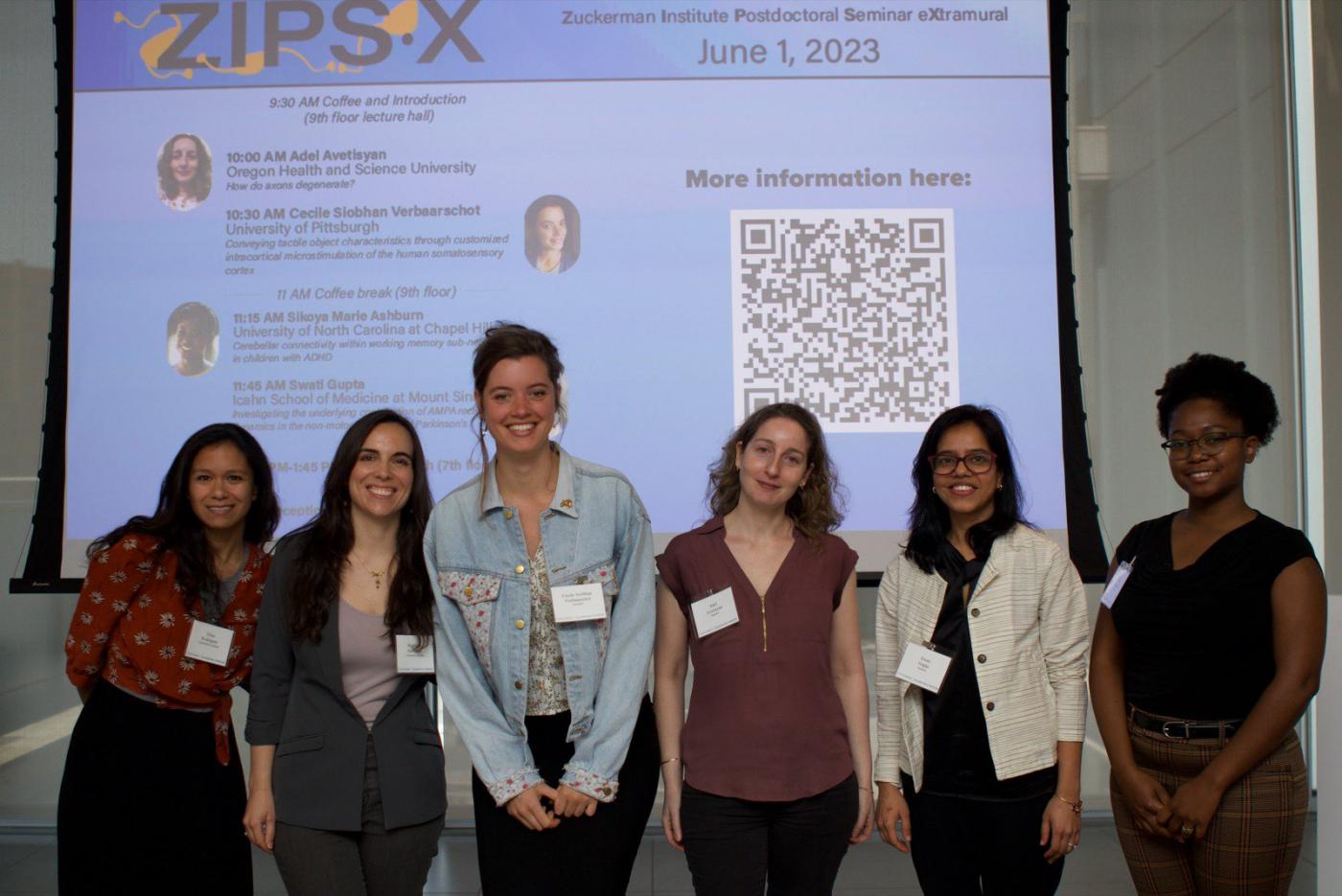NEW YORK, NY — As postdoctoral researcher Cecile Verbaarschot, PhD, from the University of Pittsburgh chronicled her neurotechnology investigation – replete with direct stimulation of a specific brain area in a human patient to restore his sense of touch – her audience at the Zuckerman Institute was rapt.
After her talk on June 1, the audience of postdoctoral neuroscientists, principal investigators and others pushed the limit on the allotted Q&A time. It was the same for the three other postdoctoral presenters who traveled from their home universities to share their studies of neuron degeneration, memory in children with attention-deficit/hyperactivity disorder and cellular receptors involved in Parkinson’s disease. The morning talks segued into an energized lunch around a big oval table, afternoon meetings rife with potential for exciting new collaborations and an evening reception.
“This is why it has been so rewarding for me to organize these events,” said Stephanie Herrlinger, PhD, referring to many seminars she has run since 2020, when she took over the Zuckerman Institute Postdoctoral Seminar (ZIPS) series. The June 1 gathering was the inaugural ZIPS-eXtramural (ZIPS-X) event in which Dr. Herrlinger and co-organizer Erica Rodriguez, PhD, both Zuckerman postdoctoral scientists, showcased speakers from beyond Columbia.
The postdoctoral seminars are the brainchild of Anita Devineni, PhD, who was a postdoctoral scientist at Columbia’s Zuckerman Institute until 2022.
“Our goal in starting the seminars was to provide opportunities for postdocs to share their work, get feedback, form new collaborations and meet people from other labs,” said Dr. Devineni, now an assistant professor of biology at Emory University. “The Zuckerman Institute was extremely supportive, providing us with encouragement and funding.”
The first Zuckerman postdoctoral seminar took place in September 2018 as an hour-long gathering in which two postdocs gave 20-minute talks about their research, followed by a Q&A. The series shifted into virtual gatherings during the pandemic and returned to in-person events in late 2022.
“I thought it would benefit all of us if we brought in postdocs doing neuroscience from the medical campus uptown and from the Morningside campus to our Manhattanville campus right in the middle,” said Dr. Herrlinger, a fourth-year postdoc whose own work in the Gogos and Losonczy labs centers on brain-circuit disruption in neuropsychiatric disorders.
So far, there have been more than 30 events featuring more than 100 postdocs from the Zuckerman Institute and across Columbia.
Our goal in starting the seminars was to provide opportunities for postdocs to share their work, get feedback, form new collaborations and meet people from other labs.
The program continues to expand and evolve. The new ZIPS-X events are all-day, in-person neuroscience postdoctoral research symposiums designed to promote late-stage postdocs from external institutions at Columbia’s Zuckerman Institute. The goal is to share research and broaden networks for postdoctoral scientists who are taking the next steps in their career.
Thiago Arzua, PhD, a Zuckerman postdoctoral scientist in the Marlin lab who plans to give an upcoming ZIPS talk, was among the attendees at the June 1 event. A regular participant of the ZIPS series, he credits the initiative with helping postdocs get to know and support one another, and to take concrete professional steps, such as getting presentations ready and honing public-speaking skills in a friendly, low-pressure environment. These events offer a rare opportunity to talk about research in progress that’s not yet ready for publication, he said.
Katie Insel, PhD, a ZIPS speaker in 2021, also was in attendance. As a psychology researcher studying how learning, memory and decision-making develop in adolescent brains, she values that the events bring together participants with a diversity of perspectives, such as those from computational and molecular neuroscience.
“If you are a grad student, you enter your program with a cohort of other students, and so you have an instant peer community,” said Dr. Insel, a postdoctoral scientist in the lab of Daphna Shohamy, PhD. “Postdocs come into labs one at a time, and so that sense of community isn’t automatic. This type of postdoc program helps to fill that gap and advance the science.”
To further the tent-enlarging cause, Dr. Herrlinger has been partnering with Dr. Rodriguez, a postdoc in the Salzman lab, who helps lead the Zuckerman Institute Gender Inclusion (ZIGI) group. It was founded in 2022 by postdoctoral fellow Dr. Danique Jeurissen and former Zuckerman postdoc Dr. Anne Loffler (now a data scientist in a patient-care firm).
“The gender inclusion group offers a safe, supportive advocacy space for people who have been historically marginalized in science fields due to their gender identity and expression,” Dr. Rodriguez said. Now the two groups work together on the ZIPS-X programming, promotion, cost-sharing and administrative tasks.
At many institutions, postdocs represent a class of scientists that are overlooked when it comes to scientific and social programs, Dr. Herrlinger said. “This is the gap we are working to fill.”
“These platforms are invaluable in fostering connections,” added Vanessa Lecorps, Zuckerman Institute's senior director of diversity, equity, inclusion and belonging. “We look forward to seeing these initiatives grow and host similar symposiums for other affinity groups with specific interests and goals.”
